“Vaginal wellness goes beyond only warding against infections. Feeling at ease, secure, and in control of one’s physical self is the ultimate goal. “- Wellness Kraft
Introduction
For the general health and well-being of women, maintaining vaginal health is important. The vagina is a self-cleaning organ that is designed to keep itself healthy, but there are steps women can take to promote vaginal health and prevent infections and other issues. In this article, we will discuss some tips and tricks for maintaining vaginal health that will help women stay healthy and comfortable. By following these guidelines, women can take an active role in their own health and feel more confident and comfortable in their bodies.
Table of Contents
Types of Vaginal Infections

There are several types of vaginal infections that women may experience, including:
1.Bacterial Vaginosis:
This is a common vaginal infection caused by an imbalance of bacteria in the vagina. Symptoms may include a strong, fishy odor and abnormal discharge.
2.Yeast Infections:
These are caused by an overgrowth of yeast in the vagina. Symptoms may include itching, burning, and a thick, white discharge. This causes an adverse effect on vaginal health.
3.Trichomoniasis:
This is a sexually transmitted infection caused by a parasite. Symptoms may include itching, burning, and a foul-smelling discharge.
4.UTIs:
While not typically considered a vaginal infection, urinary tract infections (UTIs) can cause discomfort in the vaginal area. Symptoms may include pain or burning during urination, frequent urination, and cloudy or strong-smelling urine.
It is important for women to be aware of the symptoms of these types of vaginal infections and seek medical treatment promptly if they suspect they may have an infection. Left untreated, vaginal infections can lead to more serious health issues and discomfort.
Causes of Vaginal Infections
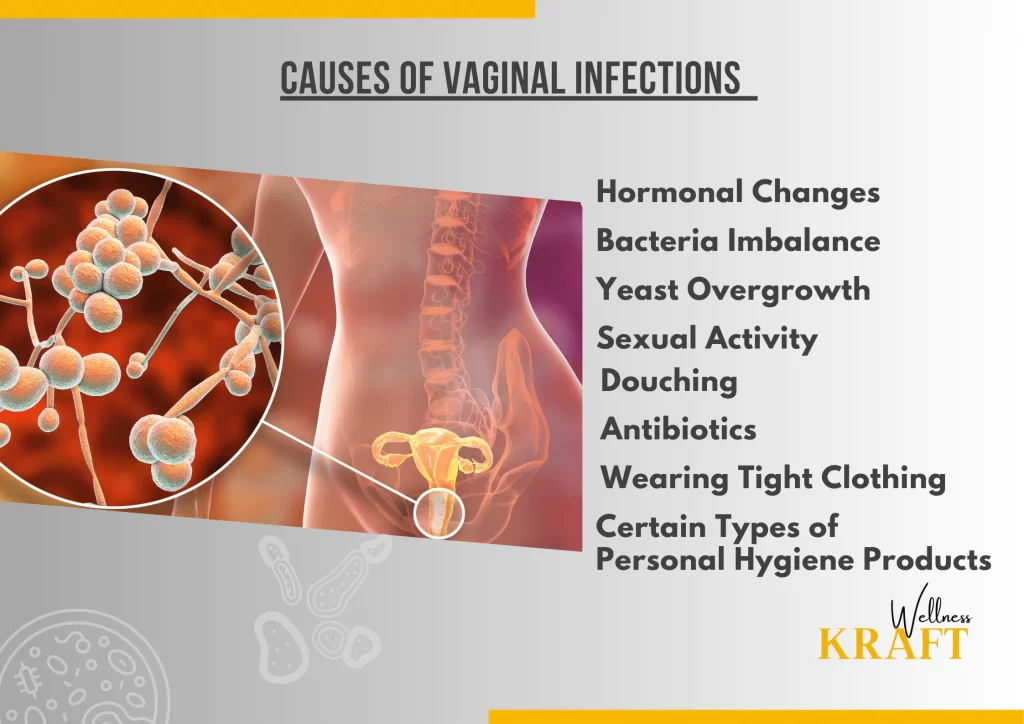
Vaginal infections can be caused by a variety of factors, including:
1.Bacteria Imbalance:
The vagina is home to a delicate balance of bacteria, which helps to keep it healthy. When this balance is disrupted, it can lead to bacterial vaginosis or other infections.
2.Yeast Overgrowth:
Yeast infections can occur when there is an overgrowth of yeast in the vagina, often due to a disruption of the vaginal microbiome.
3.Sexual Activity:
Some types of vaginal infections, such as trichomoniasis, are sexually transmitted. Sexual activity can also disrupt the natural balance of bacteria in the vagina, leading to infections.
4.Antibiotics:
Antibiotics can disrupt the balance of bacteria in the vagina, leading to an overgrowth of harmful bacteria and an increased risk of infection.
5.Hormonal Changes:
Changes in hormones, such as during pregnancy or menopause, can also increase the risk of vaginal infections.
6.Other Factors:
Other factors that can contribute to vaginal infections include douching, wearing tight clothing or synthetic fabrics, and using certain types of personal hygiene products.
By understanding the causes of vaginal infections, women can take steps to prevent them and maintain a healthy vaginal microbiome.
Symptoms of Vaginal Infections
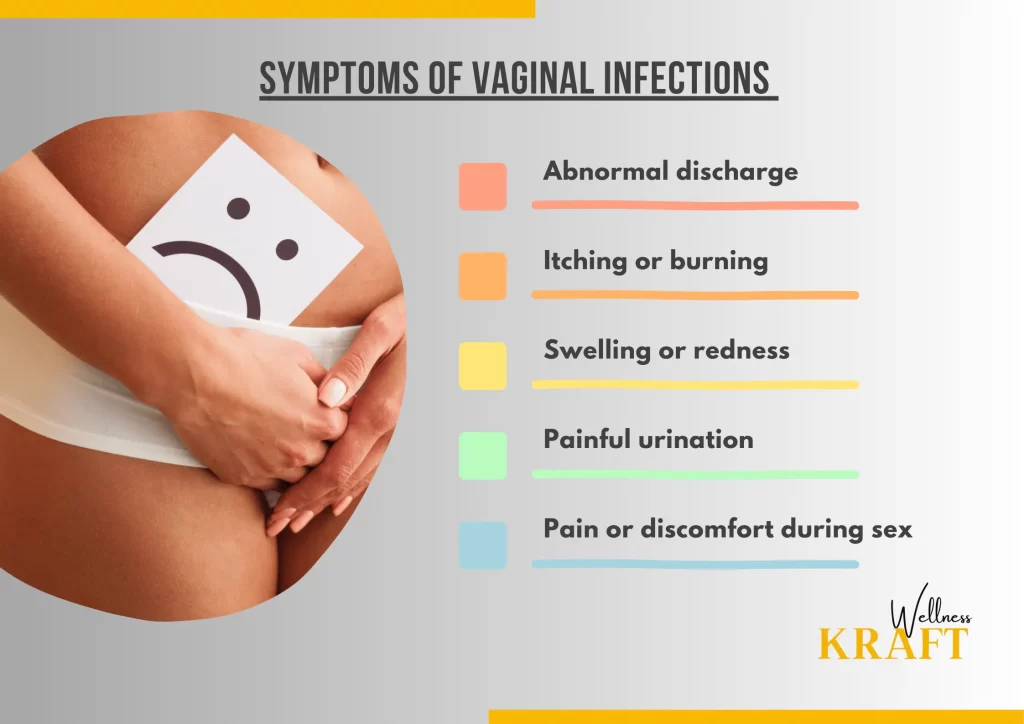
The symptoms of vaginal infections can vary depending on the type of infection, but some common symptoms include:
1.Abnormal discharge:
This may be thick, white, yellow, green, or frothy in texture, and may have a foul odour.
2.Itching or burning:
Women may experience itching, burning, or soreness in the vaginal area, which can be uncomfortable.
3.Pain or discomfort during sex:
Vaginal infections can cause pain or discomfort during sexual activity, which can interfere with intimacy.
4.Painful urination:
Some types of vaginal infections, such as UTIs, can cause pain or burning during urination.
5.Swelling or redness:
The vaginal area may appear swollen, red, or inflamed in some cases.
It is important for women to pay attention to any changes in their vaginal health and seek medical attention if they experience any of these symptoms. Prompt treatment can help to alleviate discomfort and prevent more serious health issues from developing.
Types of Women Getting Affected
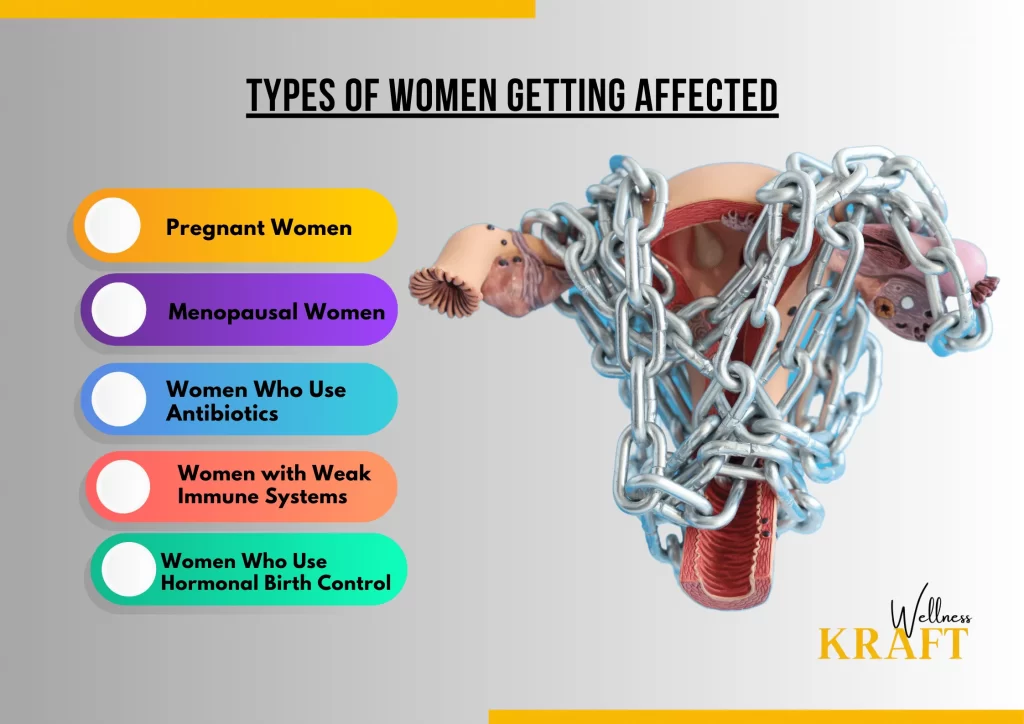
Vaginal infections can affect women of all ages and backgrounds. However, certain groups of women may be more susceptible to these infections than others. For example:
1.Pregnant women:
Pregnancy can alter the balance of bacteria in the vagina and increase the risk of developing vaginal infections.
2.Women with weakened immune systems:
Women who have weakened immune systems, such as those with HIV or who are undergoing chemotherapy, may be more susceptible to vaginal infections.
3.Women who use antibiotics:
Antibiotics can disrupt the natural balance of bacteria in the vagina, which can lead to the overgrowth of harmful bacteria and the development of infections.
4.Women who use hormonal birth control:
Hormonal birth control, such as the pill or an IUD, can alter the pH balance of the vagina and increase the risk of developing infections.
5.Menopausal women:
Changes in hormone levels during menopause can lead to thinning of the vaginal walls and a decrease in natural lubrication, which can increase the risk of vaginal infections.
It is important for women in these groups to be aware of the risk factors associated with vaginal infections and to take steps to maintain good vaginal health. This may include avoiding scented products, practicing safe sex, and eating a healthy diet. Additionally, women in these groups should consult with a healthcare provider if they experience any symptoms of a vaginal infection.
Maintaining Vaginal Health
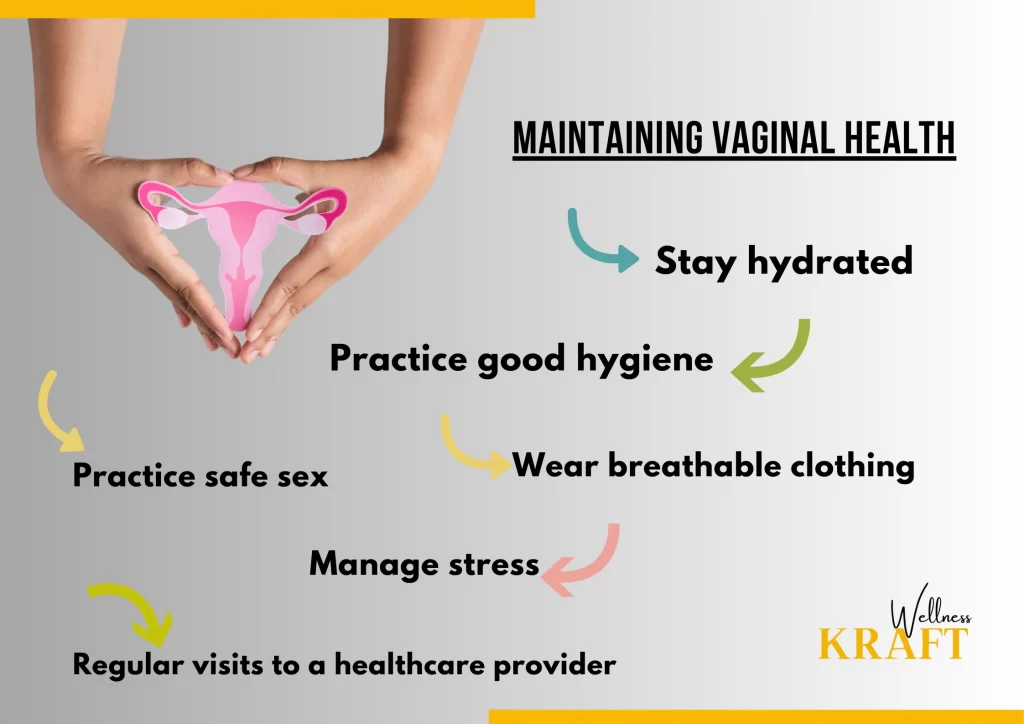
1.Practice good hygiene:
Keeping the vaginal area clean and dry is important for maintaining vaginal health. Women should avoid using scented soaps, douches, or other products that can disrupt the natural pH balance of the vagina.
2.Wear breathable clothing:
Wearing loose, breathable clothing can help to prevent moisture from building up in the vaginal area, which can lead to infections. Women should avoid tight-fitting clothing, particularly in synthetic fabrics.
3.Stay hydrated:
Drinking plenty of water can help to keep the body hydrated and promote healthy vaginal function.
4.Eat a healthy diet:
A balanced, nutrient-rich diet can help to support overall health and maintain a healthy vaginal microbiome. Women should aim to eat plenty of fruits, vegetables, whole grains, and lean protein.
5.Practice safe sex:
Using condoms or other barrier methods during sex can help to prevent the transmission of sexually transmitted infections, which can lead to vaginal infections.
6.Manage stress:
Stress can have a negative impact on vaginal health, so it is important for women to find ways to manage stress and promote relaxation.
7.See a healthcare provider:
Regular visits to a healthcare provider can help to identify and treat any potential issues before they become more serious.
By following these tips, women can help to maintain vaginal health and prevent infections. If any concerns arise, it is important to seek medical attention from a healthcare provider.
10 Natural Remedies
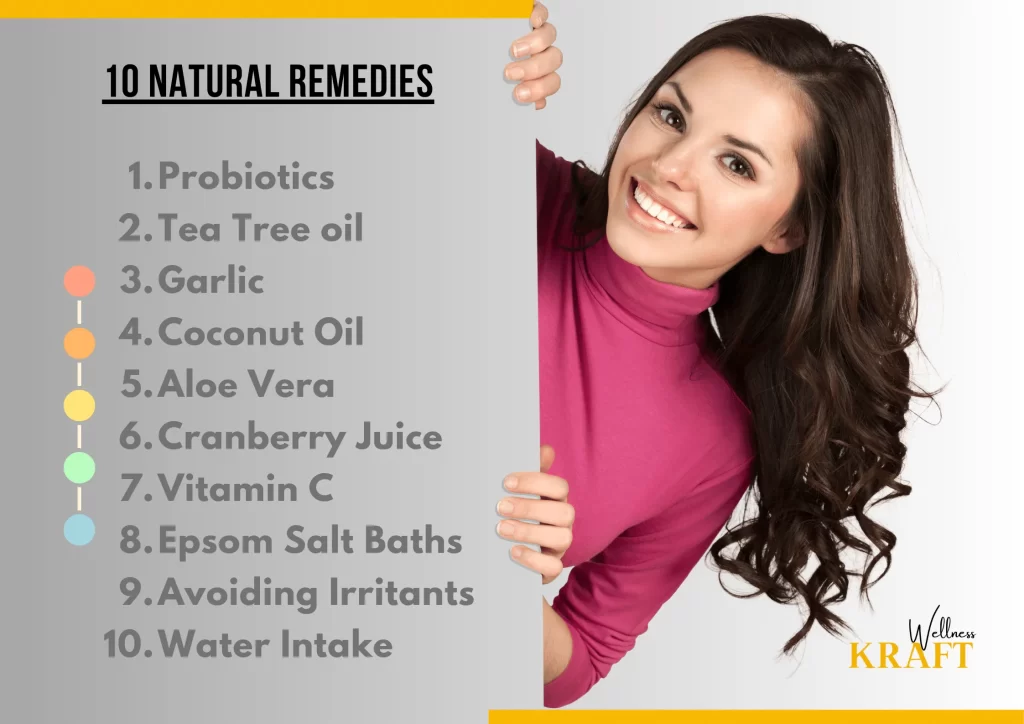
Natural remedies can be a helpful addition to medical treatment for maintaining vaginal health. Here are some of the natural remedies that may be effective:
1.Probiotics:
Probiotics are beneficial bacteria that help maintain a healthy balance of bacteria in the body. Consuming probiotics, either through supplements or fermented foods like yogurt, kefir, and kimchi, can help prevent and treat vaginal infections.
2.Tea Tree Oil:
Tea tree oil has natural antifungal and antibacterial properties that can help treat vaginal infections. However, it is important to dilute tea tree oil before applying it to the vagina and to avoid using it during pregnancy.
3.Garlic:
Garlic has natural antifungal and antibacterial properties that can help treat vaginal infections. Eating garlic or taking garlic supplements may help prevent and treat vaginal infections.
4.Coconut Oil:
Coconut oil has natural antifungal and antibacterial properties that can help prevent and treat vaginal infections. Applying coconut oil to the vagina can help soothe itching and burning.
5.Aloe Vera:
Aloe vera has natural antibacterial and anti-inflammatory properties that can help treat vaginal infections. Applying aloe vera gel to the vagina can help reduce inflammation and itching.
6.Cranberry Juice:
Drinking cranberry juice may help prevent and treat urinary tract infections, which can sometimes lead to vaginal infections.
7.Vitamin C:
Vitamin C can help boost the immune system and prevent vaginal infections. Eating foods rich in vitamin C, like citrus fruits, berries, and leafy greens, can help maintain vaginal health.
8.Epsom Salt Bath:
Taking Epsom salt baths can help soothe vaginal itching and discomfort.
9.Avoiding Irritants:
Using fragranced products like soaps, lotions, and douches can disrupt the natural balance of bacteria in the vagina. Avoiding these products can help maintain vaginal health.
10.Water Intake:
Drinking water can aid in the removal of toxins from the body and prevent urinary tract infections, which can sometimes lead to vaginal infections.
It is important to note that while natural remedies may be helpful in maintaining vaginal health, they should not be used as a substitute for medical treatment. It is always important to consult with a healthcare provider before trying any new treatments or remedies.
Types of clothes to wear during vaginal infection

When experiencing a vaginal infection, it’s essential to wear the right type of clothing to promote healing and prevent further irritation. Here are some clothing options that can help:
1.Cotton Underwear:
Wear breathable and comfortable cotton underwear. It will allow air to circulate and reduce moisture buildup, which can promote bacterial growth.
2.Loose-fitting clothing:
Wear loose-fitting clothing that allows your skin to breathe. Tight-fitting clothes can trap moisture and irritate the skin, making the infection worse.
3.Skirts and dresses:
Opt for skirts and dresses instead of pants or shorts. They will allow for better airflow and reduce skin irritation.
4.Moisture-wicking fabrics:
When exercising, wear moisture-wicking fabrics that help draw sweat away from the skin.
5.Avoid synthetic fabrics:
Synthetic fabrics, such as nylon and polyester, trap moisture and can irritate the skin. Avoid wearing them during a vaginal infection.
It’s essential to wear clean clothes and change them regularly to prevent the spread of infection. Remember to wash your clothes in hot water and avoid using fabric softeners or harsh detergents that can irritate the skin.
When Should One Consult a Doctor ?
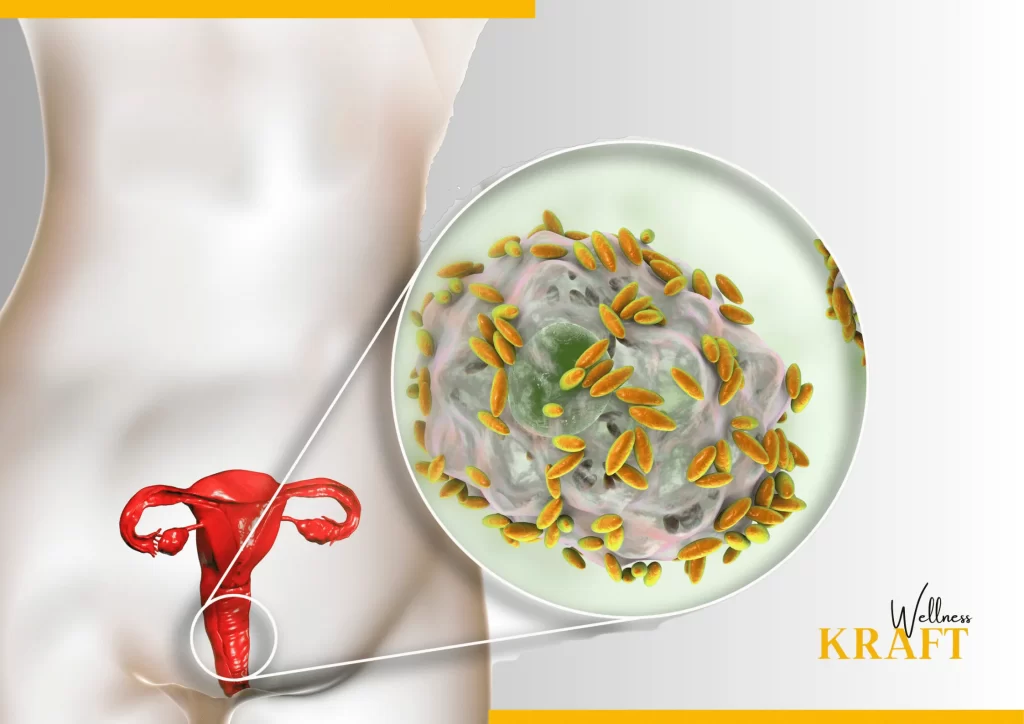
If you experience any of the symptoms mentioned earlier, it is always best to seek medical advice. It is important to note that some vaginal infections can be easily treated with home remedies, while others require medical intervention. If you have a persistent or recurrent infection, it is crucial to consult a doctor, as this may be a sign of a more serious underlying condition that needs to be addressed. Additionally, if you experience any unusual symptoms, such as bleeding, severe pain, or a foul odor, it is important to seek medical attention immediately. Remember, early detection and treatment can prevent further complications and ensure a quick recovery.
Research Analysis
There are many studies and research papers available that discuss the importance of maintaining vaginal health. For example, a study published in the Journal of Women’s Health found that women who used scented feminine products, such as sprays and washes, were more likely to experience bacterial vaginosis (BV) than those who did not use these products. The study also found that women who used lubricants during sex were more likely to experience yeast infections.
Another study published in the Journal of Obstetrics and Gynecology found that women who consumed a diet high in sugar and refined carbohydrates were more likely to experience vaginal infections than those who ate a diet high in fiber and whole grains.
Research has also shown that certain probiotics, such as Lactobacillus crispatus, can help to maintain a healthy vaginal microbiome and prevent infections. A study published in the Journal of Clinical Microbiology found that women who used a probiotic gel containing Lactobacillus crispatus had a lower risk of developing BV.
It is important to note that not all research on vaginal health is created equal, and it is important to consider the source and quality of the research before drawing any conclusions. Women should always consult with a healthcare provider before making any changes to their vaginal health routine or starting any new treatments.
Concluding Thoughts
In conclusion, maintaining vaginal health is an important aspect of overall women’s health. Vaginal infections can be uncomfortable, painful, and disruptive to daily life, but fortunately, they can be prevented and treated with proper care and attention. By following the tips outlined in this article, such as practicing good hygiene, avoiding scented products, and seeking medical attention, when necessary, women can take control of their vaginal health and prevent the development of infections.
Wellness Kart is here to help. We are dedicated to providing women with the tools and resources they need to live happy, healthy, and fulfilling lives.
Key Takeaways
1.Maintaining vaginal health is crucial for overall well-being and quality of life for women. Key takeaways on maintaining vaginal health include:
2.Practice good hygiene: Keep the vaginal area clean and dry, and avoid using harsh soaps or douches that can disrupt the natural balance of the vagina.
3.Wear breathable clothing: Choose cotton underwear and loose-fitting clothing that allows for air circulation to prevent moisture build-up.
4.Stay hydrated: Drinking plenty of water helps to flush out toxins and keep the body hydrated, including the vaginal area.
5.Eat a healthy diet: Eating a balanced diet rich in nutrients, including probiotics, can help to support vaginal health.
6.Practice safe sex: Use condoms or other forms of protection during sexual activity to reduce the risk of sexually transmitted infections.
7.Stay informed: Stay up-to-date on the latest information and research on vaginal health to make informed decisions about your own health and well-being.
By following these key tips and staying informed about vaginal health, women can take control of their health and well-being and enjoy a healthy, happy, and fulfilling life.
FAQs
1.What are the most common vaginal infections?
The most common vaginal infections include yeast infections, bacterial vaginosis, and trichomoniasis.
2.What are the symptoms of a vaginal infection?
Symptoms of a vaginal infection can include itching, burning, abnormal discharge, and pain during sex or urination.
3.What should I do to avoid vaginal infections?
Practicing good hygiene, wearing breathable clothing, staying hydrated, eating a healthy diet, and practicing safe sex are all ways to help prevent vaginal infections.
4.Can I treat a vaginal infection at home?
Some mild vaginal infections can be treated at home using over-the-counter medications or home remedies, but it is important to speak with a healthcare provider to confirm the diagnosis and ensure proper treatment.
5.When should I see a healthcare provider for a vaginal infection?
It is important to see a healthcare provider if you experience persistent or severe symptoms, or if you are unsure about the cause of your symptoms.
6.Are vaginal infections sexually transmitted?
Some vaginal infections, such as trichomoniasis and certain types of bacterial vaginosis, can be sexually transmitted. However, yeast infections are not typically transmitted through sexual activity.
7.Can I still have sex if I have a vaginal infection?
It is generally recommended to avoid sexual activity until a vaginal infection has been properly diagnosed and treated, in order to prevent further irritation or spread of the infection.
8.Are there any natural remedies for vaginal infections?
Some natural remedies, such as probiotics and tea tree oil, may be helpful in preventing or treating certain types of vaginal infections. However, it is important to speak with a healthcare provider before using any natural remedies.
9.Can certain foods affect vaginal health?
Eating a healthy, balanced diet that is rich in nutrients, including probiotics, can help to support vaginal health. However, consuming excessive amounts of sugar or processed foods can disrupt the natural balance of the vagina and increase the risk of infections.
10.How often should I get a gynecological exam?
It is generally recommended for women to receive a gynecological exam, including a pelvic exam and Pap smear, at least once a year or as recommended by their healthcare provider.



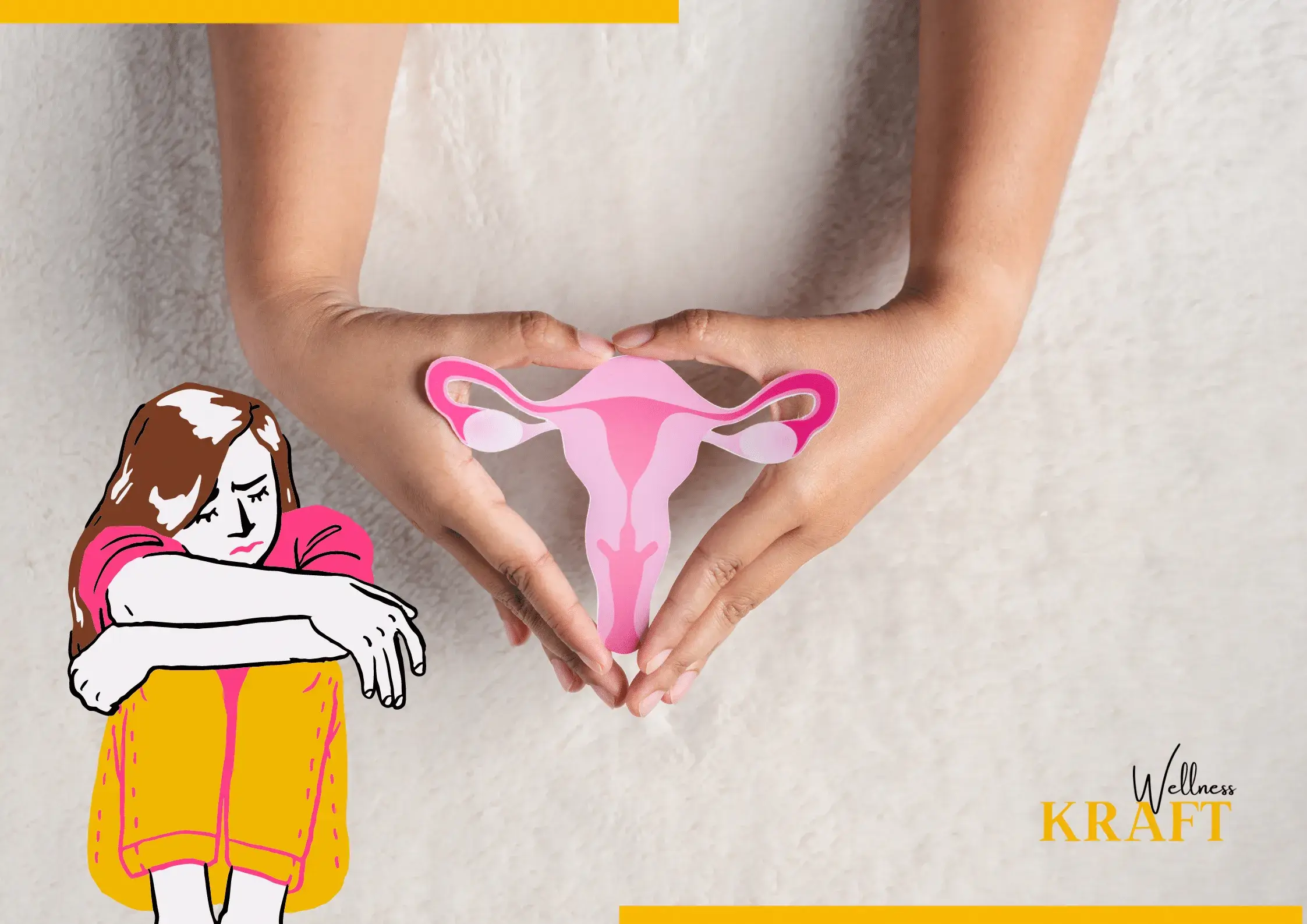






1 comment